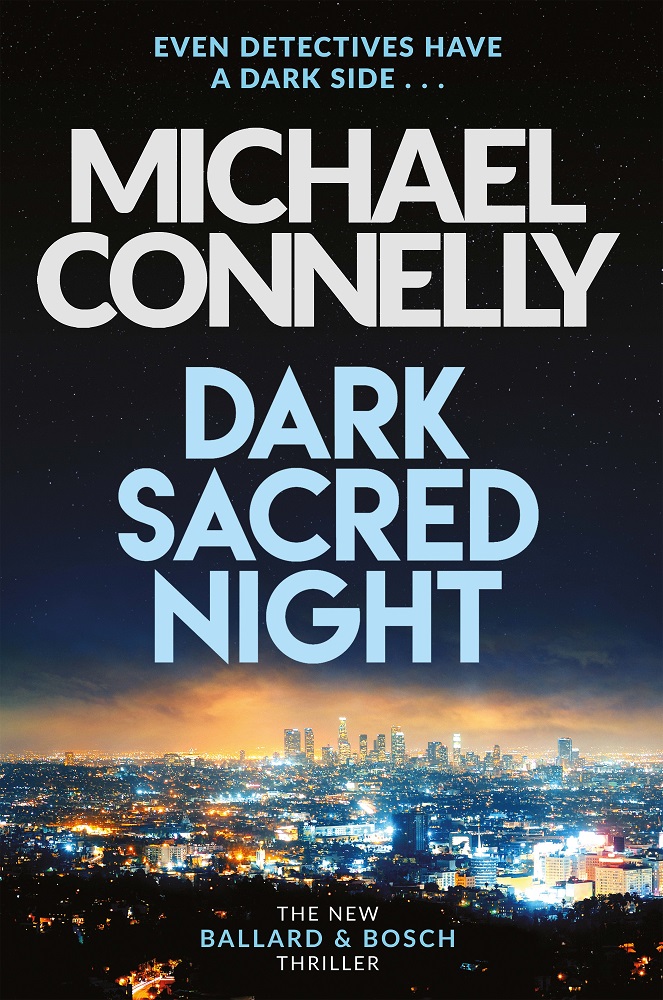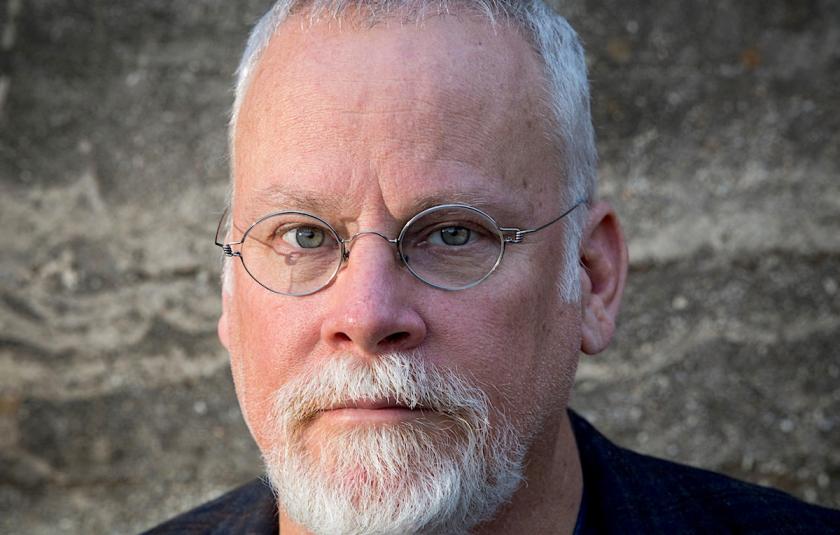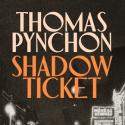The master of the Southern California police procedural is back. In Dark Sacred Night Michael Connelly puts centre stage his oldest creation, the Vietnam veteran turned original, ethical policeman who marches to his own moralities, Hieronymous – aka known, natch, as Harry – Bosch, paired for the first time with his newest one, the resourceful Renée Ballard. Billed as the new “Bosch & Ballard tale”, it is the first novel in which they meet and work together, chapters alternating between the two.
The pairing of loners is typical. Bosch’s overwhelming need, now that he is retired but working part-time, is to open up cold cases that have bothered him for years, even decades. The horrible death of a very young runaway turned prostitute, Daisy Clayton, has not only bothered him for years but in an unwise and impulsive move he has taken her recovering drug-addict and guilt-ridden mother Elizabeth into his own home, thereby alienating the college-age daughter he adores. Connelly is always topical: we first met Elizabeth in Two Kinds of Truth, his take on the illegal side of the opioid crisis where addicts are fed through dubious clinics organised by gangs.
 While Bosch’s emotional dysfunction is familiar, Ballard has appeared just once in a novel given over to her as the chief protagonist, The Late Show. She is herself an eccentric, on the graveyard (night) shift, having been moved from the elite Robbery-Homicide division because of her official accusation of sexual harassment against her superior. Ballard’s own experiences and what she has witnessed have confirmed her in her view “that in the world of men and women, there would never be a time when women were viewed and treated completely as equals.” Highly skilled, curious, energetic, she lives unconventionally in a tent on the nearby beach, surfing or paddleboarding during the day, her van housing her few clothes, carefully organised into a dry cleaning cycle, and her water sports equipment. Ballard is good-looking and very fit, brought up in Hawaii: her mother went on an early walkabout and her father presumably drowned when she was 14, his mutilated surfboard washed up on the beach. The parentless Renée was sent to her grandmother in LA. Now in her thirties, Ballard’s emotional life seems to be confined to an occasional hook-up with the handsome local lifeguard; her most constant companion is her dog, Lola. Connelly’s understanding of how their personal past affects his protagonists is one of the fascinations of his novels.
While Bosch’s emotional dysfunction is familiar, Ballard has appeared just once in a novel given over to her as the chief protagonist, The Late Show. She is herself an eccentric, on the graveyard (night) shift, having been moved from the elite Robbery-Homicide division because of her official accusation of sexual harassment against her superior. Ballard’s own experiences and what she has witnessed have confirmed her in her view “that in the world of men and women, there would never be a time when women were viewed and treated completely as equals.” Highly skilled, curious, energetic, she lives unconventionally in a tent on the nearby beach, surfing or paddleboarding during the day, her van housing her few clothes, carefully organised into a dry cleaning cycle, and her water sports equipment. Ballard is good-looking and very fit, brought up in Hawaii: her mother went on an early walkabout and her father presumably drowned when she was 14, his mutilated surfboard washed up on the beach. The parentless Renée was sent to her grandmother in LA. Now in her thirties, Ballard’s emotional life seems to be confined to an occasional hook-up with the handsome local lifeguard; her most constant companion is her dog, Lola. Connelly’s understanding of how their personal past affects his protagonists is one of the fascinations of his novels.
Seeking to investigate the cold case of Daisy Clayton’s horrific murder by an obvious sexual pervert – the girl’s mutilated, tortured and violated body was bleached to conceal evidence – Bosch comes to investigate some files in her department. She picks up on it, and after some sniffing around each other they agree to trust and work together, only semi-officially and mostly under the radar.
Over just a few days, there is a dazzling array of cases from the past and, simultaneously in the here-and-now, the hustle of events from the inconsequential to the mortally dangerous
Ballard continues her own professional life; there is an hilarious and disquieting take on #MeToo when she is the lead officer on call when a film star comedian is accused of anal rape. Both he and his “victim”, it turns out, have in different ways transgressed the law. Throughout the novel varied levels of misogyny are called out, as Bosch and Ballard doggedly work on the cold case, the most extreme manifestation of sexual predation. Bosch, semi-retired and working out of San Fernando in the Valley rather than Hollywood and Los Angeles, seems to himself to be losing his edge and makes a mistake or two that have unlooked-for and edgy consequences: he is singled out for a hit by one of the most ferocious gangs in the area as he investigates a cold-case gang murder.
Over just a few days, as is Connelly’s wont, there is a dazzling array of cases from the past and, simultaneously in the here-and-now, the hustle of events from the inconsequential to the mortally dangerous. Equally fascinating is a host of professional relationships within the LAPD and neighbouring police forces, and descriptions which indicate the rich array of characters and ethnicities both in the sprawling conurbations of LA and within the police themselves. We even encounter the awesome and terrifying police equivalent of the SAS, who are certainly not averse themselves to riding over the law, their amorality tacitly approved by colleagues as they take the bad guys out.
One of Connelly’s immense talents is that in the midst of a complex web of events from the past impacting the present and the cacophony of current episodes, the reader is always at home in the labyrinth of various plots and quotidian complexities. Bosch’s credo, however unconventional his methodology, is clear: “he had always operated according to the axiom that everybody counts in this world or nobody counts. This belief dictated that he must give each case and each victim his best effort.” This is so even when the gangland cold case involves the murder of someone known as Uncle Murda, and “the world was doing just fine without Uncle Murda.”
Brilliantly written in Connelly’s inimitable descriptive style and compulsively readable, we keep company with his characters in the traffic jams of LA and the endless cheap diners where the cops catch their breakfast after an all-nighter. The intertwining of character is as fascinating as the cases they confront, and we are along breathlessly for the whole ride. We can only hope that the team of Ballard and Bosch will run for some years to come.
- Dark Sacred Night by Michael Connelly (Orion hardback £20, eBook £9.99)
- Read more book reviews at theartsdesk














